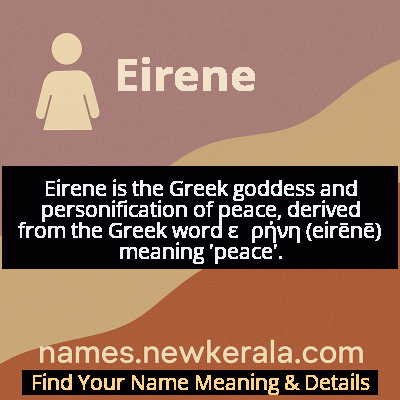Eirene Name Meaning & Details
Origin, Popularity, Numerology Analysis & Name Meaning of Eirene
Discover the origin, meaning, and cultural significance of the name EIRENE. Delve into its historical roots and explore the lasting impact it has had on communities and traditions.
Name
Eirene
Gender
Female
Origin
Greek
Lucky Number
2
Meaning of the Name - Eirene
Eirene is the Greek goddess and personification of peace, derived from the Greek word εἰρήνη (eirēnē) meaning 'peace'.
Eirene - Complete Numerology Analysis
Your Numerology Number
Based on Pythagorean Numerology System
Ruling Planet
Moon
Positive Nature
Diplomatic, friendly, artistic, empathetic.
Negative Traits
Over-sensitive, moody, indecisive, prone to self-pity.
Lucky Colours
Green, cream, white.
Lucky Days
Monday.
Lucky Stones
Pearl, moonstone.
Harmony Numbers
1, 3, 4.
Best Suited Professions
Diplomats, mediators, caregivers, artists.
What People Like About You
Cooperative spirit, friendliness, artistic talent.
Famous People Named Eirene
Eirene of Athens
Ancient Greek noblewoman
Daughter of famous orator Isocrates, known for her education and cultural influence in Classical Athens
Eirene (Byzantine Empress)
Byzantine Empress
Wife of Emperor Leo IV, mother of Constantine VI, played significant role in Byzantine politics during the Iconoclasm controversy
Eirene Laskarina
Byzantine Princess
Daughter of Theodore I Laskaris, Empress of Nicaea, important figure in the Laskarid dynasty
Eirene Papas
Greek actress
Internationally acclaimed actress known for roles in 'Zorba the Greek' and 'The Trojan Women', recipient of multiple awards
Name Variations & International Equivalents
Click on blue names to explore their detailed meanings. Gray names with will be available soon.
Cultural & Historical Significance
In the Byzantine Empire, the name Eirene became associated with imperial power and religious significance. Several empresses bearing this name influenced Byzantine politics and the Iconoclasm controversy. The most notable, Empress Irene of Athens, famously ruled as sole empress and convened the Second Council of Nicaea. This historical legacy cemented Eirene's connection to female power, religious authority, and political diplomacy. The name's endurance through Christianization demonstrates how its core meaning of peace transcended religious boundaries, adapting while maintaining its fundamental significance across cultural transformations.
Extended Personality Analysis
Those named Eirene typically embody the qualities their name represents: they are natural peacemakers who excel at resolving conflicts and creating harmonious environments. Their calm exterior often conceals a deep emotional intelligence and remarkable patience. Eirenes tend to be excellent mediators who can understand multiple perspectives without taking sides, making them invaluable in both personal and professional settings. They possess an innate sense of fairness and often become advocates for justice, though they prefer diplomatic solutions to confrontation.
Beyond their peacemaking abilities, Eirenes are often creative, thoughtful individuals who value beauty and balance in their surroundings. They tend to be reliable friends and partners who provide stable emotional support during turbulent times. While generally gentle, they can demonstrate surprising strength when defending their principles or protecting loved ones. Their combination of emotional stability, intellectual curiosity, and social grace makes them well-rounded individuals who contribute positively to their communities. Many Eirenes find fulfillment in careers that involve healing, teaching, or creating harmony among people.
Modern Usage & Popularity
In contemporary times, Eirene maintains its strongest presence in Greece and Cypriot communities, where the modern spelling 'Eirini' frequently appears in birth announcements. While the classical form 'Eirene' is less common internationally than its Anglicized version 'Irene', it has experienced a revival among parents seeking unique mythological names with profound meanings. The name appeals to modern parents who value both classical education and positive virtues they hope to instill in their children. In English-speaking countries, Eirene remains relatively rare but stable, often chosen by families with Greek heritage or those particularly interested in classical studies. Recent years have seen increased interest in mythological names, positioning Eirene for potential growth as parents move beyond more common classical names like Athena or Diana. The name's beautiful pronunciation and association with universally valued concepts ensure its continued relevance across cultures.
Symbolic & Spiritual Meanings
Eirene's symbolic meaning extends far beyond the simple concept of peace to encompass the entire ecosystem of conditions that enable human flourishing. She represents the fertile ground where civilization, arts, and commerce can grow—the antithesis of the destruction and stagnation caused by conflict. In ancient symbolism, her connection to spring and renewal positions peace as a cyclical, renewable resource that requires cultivation. The olive branch she carries symbolizes not just ceasefire but the promise of future prosperity and reconciliation.
Metaphorically, Eirene represents both external peace between nations and internal peace within individuals. She embodies the idea that true harmony requires balance in all aspects of life: personal relationships, community interactions, and our relationship with nature. In psychological terms, she symbolizes the integration of conflicting aspects of personality into a harmonious whole. For modern interpreters, Eirene serves as a reminder that peace is an active state requiring constant nurturing rather than a passive condition. Her enduring symbolism speaks to humanity's deepest aspirations for a world where creativity, justice, and prosperity can thrive unimpeded by violence or discord.

